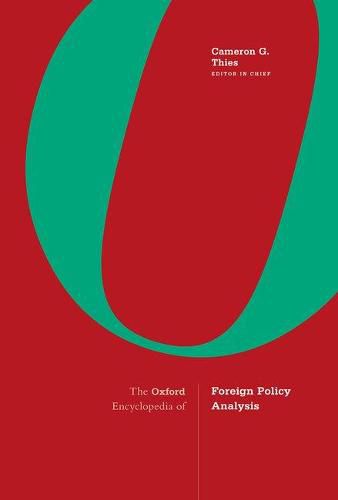Readings Newsletter
Become a Readings Member to make your shopping experience even easier.
Sign in or sign up for free!
You’re not far away from qualifying for FREE standard shipping within Australia
You’ve qualified for FREE standard shipping within Australia
The cart is loading…






This two-volume encyclopedia brings together leading scholars to provide the most comprehensive and up-to-date resource on foreign policy analysis ever produced. In over 100 peer-reviewed entries, readers will find authoritative overviews of the theoretical, methodological, and substantive areas of interest in the realm of foreign policy.Theoretically, The Oxford Encyclopedia of Foreign Policy Analysis examines traditional approaches derived from international relations, such as realism, liberalism, constructivism, and feminism. It also reviews the domestic politics approaches to foreign policy analysis so frequently used in this subfield, including two-level games, veto players, and diversionary theory. Middle-range theories are also surveyed, including role theory, securitization theory, and other conceptual innovations, such as path dependency and emotions. Additionally, approaches grounded in political psychology and decision making are explored in depth, including entries on beliefs, crisis decision making, the use of analogies and metaphors, and many others.Methodologically, the essays examine the state of the literature and provide guidance for readers on archival research, historiography, the use of counterfactuals, discourse analysis, simulations, and agent-based models, as well as quantitative methods. The Encyclopedia also surveys the major actors involved in foreign policy, from society to governmental and global actors. The work also informs readers on the kinds of strategies, tools, and techniques employed by actors through entries on the use of force, arms control, diplomacy, foreign aid, mediation, negotiation, peacekeeping, and sanctions, among other topics. Finally, it covers important substantive issues in foreign policy, including climate change, ethics, immigration, maritime piracy, nuclear proliferation, and terrorism. Readers seeking in-depth, foundational essays on both core and emerging topics will find comprehensive examinations of the vast and growing literature in foreign policy analysis.
$9.00 standard shipping within Australia
FREE standard shipping within Australia for orders over $100.00
Express & International shipping calculated at checkout
This two-volume encyclopedia brings together leading scholars to provide the most comprehensive and up-to-date resource on foreign policy analysis ever produced. In over 100 peer-reviewed entries, readers will find authoritative overviews of the theoretical, methodological, and substantive areas of interest in the realm of foreign policy.Theoretically, The Oxford Encyclopedia of Foreign Policy Analysis examines traditional approaches derived from international relations, such as realism, liberalism, constructivism, and feminism. It also reviews the domestic politics approaches to foreign policy analysis so frequently used in this subfield, including two-level games, veto players, and diversionary theory. Middle-range theories are also surveyed, including role theory, securitization theory, and other conceptual innovations, such as path dependency and emotions. Additionally, approaches grounded in political psychology and decision making are explored in depth, including entries on beliefs, crisis decision making, the use of analogies and metaphors, and many others.Methodologically, the essays examine the state of the literature and provide guidance for readers on archival research, historiography, the use of counterfactuals, discourse analysis, simulations, and agent-based models, as well as quantitative methods. The Encyclopedia also surveys the major actors involved in foreign policy, from society to governmental and global actors. The work also informs readers on the kinds of strategies, tools, and techniques employed by actors through entries on the use of force, arms control, diplomacy, foreign aid, mediation, negotiation, peacekeeping, and sanctions, among other topics. Finally, it covers important substantive issues in foreign policy, including climate change, ethics, immigration, maritime piracy, nuclear proliferation, and terrorism. Readers seeking in-depth, foundational essays on both core and emerging topics will find comprehensive examinations of the vast and growing literature in foreign policy analysis.